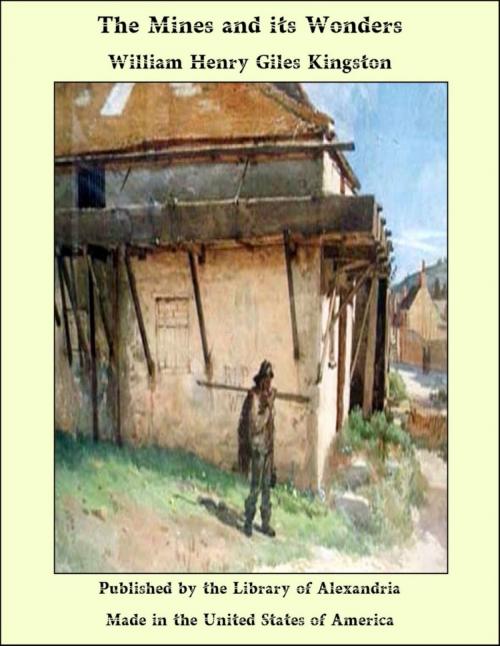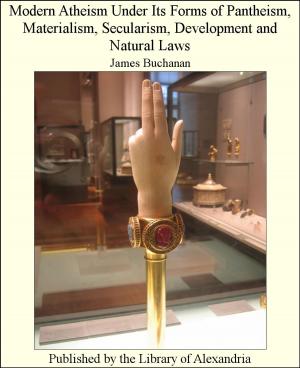The Mines and its Wonders
Nonfiction, Religion & Spirituality, New Age, History, Fiction & Literature| Author: | William Henry Giles Kingston | ISBN: | 9781465596369 |
| Publisher: | Library of Alexandria | Publication: | March 8, 2015 |
| Imprint: | Language: | English |
| Author: | William Henry Giles Kingston |
| ISBN: | 9781465596369 |
| Publisher: | Library of Alexandria |
| Publication: | March 8, 2015 |
| Imprint: | |
| Language: | English |
A hum of human voices rose from a village in the centre of England, but they were those of women, girls, and children, the latter playing in the street, running, skipping, laughing, singing, and shouting in shrill tones, the former in their yards or in front of their dwellings, following such avocations as could be carried on out of doors on that warm summer evening. Not a man or lad, not even a boy above eight years old, was to be seen. On one side of the village far away could be distinguished green fields, picturesque hills, widespreading trees, and a sparkling stream flowing in their midst; on the other, nearer at hand, a dreary black region, the ground covered with calcined heaps, the roads composed of coal dust or ashes, and beyond, tall chimneys sending forth dense volumes of smoke, which, wreathing upwards, formed a dark canopy over the scene. Then there were large uncouth buildings, above which huge beams appeared, lifting alternately their ends with ceaseless motion, now up, now down, engaged evidently in some Titanic operation, while all the time proceeding from that direction were heard groans, and shrieks, and whistlings, and wailings, and the sound of rushing water, and the rattling and rumbling of tram or railway waggons rushing at rapid speed across the country, some loaded with huge lumps of glittering coal, others returning to be refilled at the pit’s mouth. Those high buildings contained the steam-engines which worked the machinery employed in the coal mine; the tall chimneys carried up the smoke from the furnaces and produced the current of air which kept them blazing. The deafening noises came from cranks, pulleys, gins, whimsays, and other contrivances for lifting the coal from the bottom of the mine, pumping out the water, loading the waggons, ventilating the shafts and galleries, and for performing duties innumerable of various descriptions. As the evening drew on, the women retired into their cottages to prepare supper for their husbands and sons, whose return home they were now expecting. Already the corves which took them down to their work in the early morning must be on their way up to the surface, and it is time to have the savoury messes ready for dishing up. Abundance is on the board, for the miner’s wages are sufficient to supply him with what would be luxuries to an ordinary labourer above ground; but were they far higher, could they repay him for a life of constant danger, of hard incessant toil, and the deprivation for more than half the year of a sight of the blue sky, the warming rays of the sun, and the pure air of heaven, except on the one blessed day of the week when he enjoys them with the rest of God’s creatures? For months together he descends the shaft in the gloom of morning and does not return till darkness has again shrouded the earth.
A hum of human voices rose from a village in the centre of England, but they were those of women, girls, and children, the latter playing in the street, running, skipping, laughing, singing, and shouting in shrill tones, the former in their yards or in front of their dwellings, following such avocations as could be carried on out of doors on that warm summer evening. Not a man or lad, not even a boy above eight years old, was to be seen. On one side of the village far away could be distinguished green fields, picturesque hills, widespreading trees, and a sparkling stream flowing in their midst; on the other, nearer at hand, a dreary black region, the ground covered with calcined heaps, the roads composed of coal dust or ashes, and beyond, tall chimneys sending forth dense volumes of smoke, which, wreathing upwards, formed a dark canopy over the scene. Then there were large uncouth buildings, above which huge beams appeared, lifting alternately their ends with ceaseless motion, now up, now down, engaged evidently in some Titanic operation, while all the time proceeding from that direction were heard groans, and shrieks, and whistlings, and wailings, and the sound of rushing water, and the rattling and rumbling of tram or railway waggons rushing at rapid speed across the country, some loaded with huge lumps of glittering coal, others returning to be refilled at the pit’s mouth. Those high buildings contained the steam-engines which worked the machinery employed in the coal mine; the tall chimneys carried up the smoke from the furnaces and produced the current of air which kept them blazing. The deafening noises came from cranks, pulleys, gins, whimsays, and other contrivances for lifting the coal from the bottom of the mine, pumping out the water, loading the waggons, ventilating the shafts and galleries, and for performing duties innumerable of various descriptions. As the evening drew on, the women retired into their cottages to prepare supper for their husbands and sons, whose return home they were now expecting. Already the corves which took them down to their work in the early morning must be on their way up to the surface, and it is time to have the savoury messes ready for dishing up. Abundance is on the board, for the miner’s wages are sufficient to supply him with what would be luxuries to an ordinary labourer above ground; but were they far higher, could they repay him for a life of constant danger, of hard incessant toil, and the deprivation for more than half the year of a sight of the blue sky, the warming rays of the sun, and the pure air of heaven, except on the one blessed day of the week when he enjoys them with the rest of God’s creatures? For months together he descends the shaft in the gloom of morning and does not return till darkness has again shrouded the earth.















